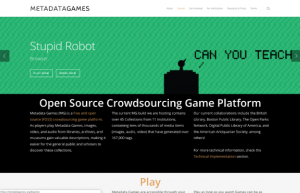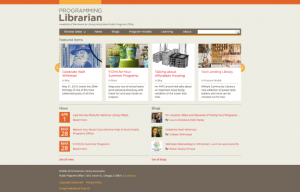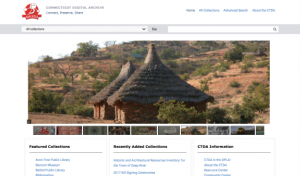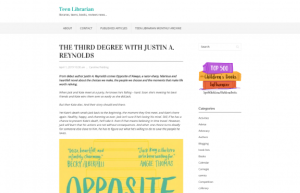Theme: National Library Week
Back to Top
|
 |
|
This American Life: The Room of Requirement
|
Social studies |
|
Public libraries offer their patrons a great deal more than their (already impressive) never-ending supply of books. This excellent episode from the acclaimed radio show and podcast This American Life explores how libraries are "often spaces that transform into what you need them to be: a classroom, a cyber cafe, a place to find answers, a quiet spot to be alone." Here, listeners will find three fascinating segments sharing stories of a library located right on the border between the US and Canada, a library whose collection solely comprises unpublished manuscripts deposited by their authors (inspired by the library in Richard Brautigan's novel The Abortion), and a library that, for six months straight, was a vital haven for a little girl who revisited as an adult. A full transcript of the audio is available, though the podcast notes that the episode "is produced for the ear and designed to be heard." A public radio fixture since 1995, This American Life is produced by WBEZ Chicago. In addition to listening on the radio or this website, those interested in subscribing may do so via Apple Podcasts, Google Podcasts, or This American Life's apps, available for iOS and Android. [JDC] |
|





|
|
 |
|
Metadata Games
|
Social studies |
|
The digital catalog of any library, archive, or museum relies on metadata (data about data) to enable searchers to get the most relevant results. As more institutions digitize their collections, a vast amount of metadata needs to be generated. But can metadata generation actually be fun? That's the premise behind Metadata Games, an "open source crowdsourcing game platform" that offers a collection of free web-based and mobile app games to create user-generated tags that "help libraries, museums, and universities across the country." The games on offer include such entertaining gems as Zen Tag, a meditative single-player activity; Guess What!, a fast-paced guessing game where players work with a random online partner to identify images; and Stupid Robot, where players teach a robot who "looks at everything but understands nothing" about images. These and others offer fun opportunities to take a quick break and help out a library or museum at the same time. As of this write-up, Metadata Games contains more than 45 collections from 11 different institutions for gamers to play with and tag. Metadata Games is directed by Professor of Digital Humanities Mary Flanagan and Archivist Peter Carini, both at Dartmouth College. Its collaborating institutions include the British Library, the Boston Public Library, and the Digital Public Library of America. [JDC] |
|





|
|
 |
|
Programming Librarian
|
Social studies |
|
Programming Librarian, a website of the American Library Association's (ALA) Public Programs Office, "provides [libraries] the resources, connections, and opportunities needed to fill their role as centers of cultural and civic life." This site may be run by the ALA, but programming ideas from around the world are shared for all to research or incorporate. Any librarian, archivist, or information professional who creates programming or does outreach can find a wide array of ideas in this collection. Visitors to the site can browse ideas by budget (starting from free) and by institution type (academic, public, school, etc.) via the browse ideas tab on the homepage. Additionally, programming for popular topics involving themes or celebrations, such as Black History Month, and audience level are also available to browse. For example, if wanting to plan a program that targets people experiencing homelessness, visitors can read about a program entitled, "Swap it Like it's Hot," a clothing exchange event for adults at the Central City Library in Auckland, New Zealand. In addition to programming ideas, the Programming Librarian has a section of its site dedicated to news and a blog, the latter of which features contributions from guest librarians writing about topics involving successful programming endeavors at their home institutions. [JLB] |
|





|
|
 |
|
Connecticut Digital Archive
|
Social studies |
|
The Connecticut Digital Archive (CTDA) is an example of the valuable online resources libraries can provide, describing itself as "a digital repository program and community dedicated to the preservation, maintenance, and delivery of a wide range of digital cultural heritage resources from memory institutions in Connecticut." This large archive includes dozens of collections with more than 75,000 digital items from public libraries, museums, and educational institutions throughout the entire state. First-time visitors may want to start by exploring the featured collections listed on the home page, which currently include the P.T. Barnum Digital Collection, the Connecticut State Museum of Natural History, and Newspapers of Connecticut, among others. Readers may search within specific collections or across the entire archive by keyword, topic, genre, place, or other fields via the site's advanced search option. Launched in November 2013, the CTDA is a collaborative program between the University of Connecticut Library and the Connecticut State Library, and it is also a partner of the Digital Public Library of America. [JDC] |
|





|
|
 |
|
Teen Librarian
|
Language Arts |
|
The Teen Librarian is a personal blog run by Matt Imrie, who is currently a school librarian but has "spent a number of years as a Children's, Teen, and Youth Services Librarian in South Africa and the United Kingdom." The blog, which is UK-based, focuses on issues relating to working with teens in a library setting, in addition to book reviews about books for young adults (YA) in the horror, crime, fantasy, and graphic novel genres. Many blog posts are authored by librarian Caroline Felding; the latest blog post (as of this writing) is entitled, " The Third Degree with Justin A. Reynolds," featuring an interview with the author of the book Opposite of Always. Other recent posts include reviews of the books Joe Quinn's Poltergeist and High Rise Mystery. In her review of High Rise Mystery, Felding said, "It isn't only brilliant because it is the first black British children's detective series for [ages] 9-12, it is brilliant because it is one of the best children's detective mysteries I have ever read!" The Teen Librarian also has a section dedicated to published articles written by Imrie and a separate monthly archive, which is available via a linked Wordpress site. [JLB] |
|





|
|












